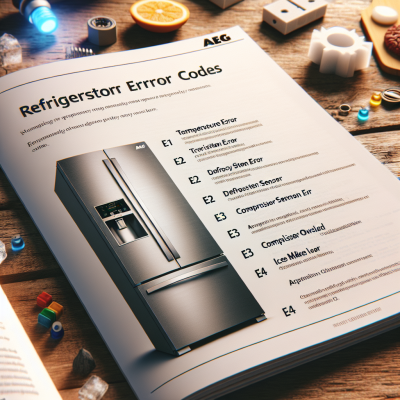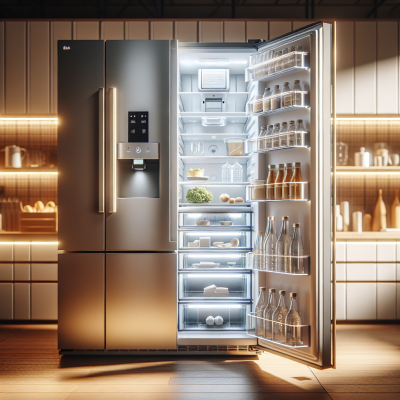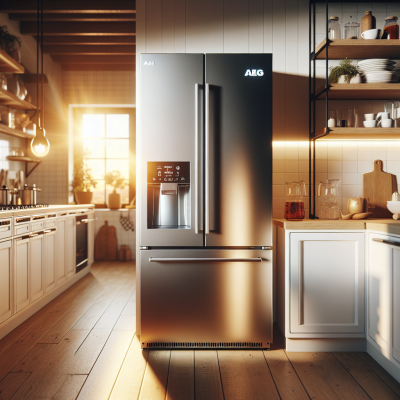Fast & Reliable LG Refrigerator Repairs - Call Now! |
Troubleshooting
Refrigerator Not Cooling
-
Common Causes and Fixes Proper cooling is critical to the performance of your refrigerator. If your refrigerator is failing to cool, several factors could be responsible:
- Power Supply Issues: Ensure the refrigerator is firmly plugged into a working power outlet. Check the circuit breaker or fuse for any issues.
- Thermostat Settings: Verify that the thermostat is set to the correct temperature. Improper settings might result in inefficient cooling.
- Dirty Condenser Coils: Over time, dust and debris can accumulate on the condenser coils. Clean them regularly to maintain efficient cooling.
- Faulty Door Seals: Inspect the door gaskets and ensure they are sealing properly. Replace any damaged or worn-out seals to prevent cool air from leaking.
- Blocked Vents: Ensure there are no items obstructing the internal air vents. This ensures proper airflow throughout the refrigerator.
Ice Maker Issues
-
Ice Maker Not Producing Ice If your ice maker is not producing ice, consider these potential causes and solutions:
- Water Supply Problems: Check that the water line is connected and the water valve is open. Inspect for kinks or blockages in the line.
- Freezer Temperature: Make sure the freezer is set to an adequate temperature (ideally 0°F or -18°C) for ice production.
- Faulty Ice Maker Unit: Inspect for any mechanical failures or malfunctions in the ice maker itself. Replacing the unit might be necessary.
-
Ice Taste and Odor Problems An unpleasant taste or odor in ice can be quite off-putting:
- Filter Issues: Change the water filter regularly to ensure pure water is used for ice.
- Stale Ice: Discard old ice accumulated over time as it might absorb freezer odors.
- Sanitation: Clean the freezer and ice tray periodically to remove any buildup of odors or residues.
Water Dispenser Problems
-
No Water Dispensing If the water dispenser is not functioning, troubleshoot the following areas:
- Water Supply: Verify that the water line is properly connected and the shut-off valve is open.
- Frozen Water Line: In cold climates, the water line might freeze. Try using a hairdryer to gently thaw it.
- Clogged Filter: Replace the water filter if it is clogged, as this can obstruct flow.
-
Water Leaks Leakages from the water dispenser are wasteful and must be rectified promptly:
- Loose Connections: Check all water line connections for tightness. Tighten any loose fittings.
- Cracked Tube: Inspect tubes for cracks or damage and replace if necessary.
- Inspect for Blockages: Debris can block the dispenser outlet, requiring cleaning or replacement.
Unusual Noises
-
Identifying Sounds and Solutions Refrigerators may produce various sounds, some normal and others indicative of issues:
- Rattling or Vibrating: Ensure the refrigerator is level and all screws are tight. Items on top may also vibrate and should be repositioned.
- Buzzing: Typically caused by the ice maker when filling with water, buzzing is normal. However, consistent loud buzzing might require a check of the fill valve.
- Humming or Whirring: The compressor or fan might produce this sound, which is usually normal unless excessively loud, indicating a possible component issue needing attention.
Condensation Inside Compartment
-
Causes and Prevention Moisture buildup inside the refrigerator can cause various problems, from food spoilage to mold growth:
- Door Gasket Leaks: Poor gaskets allow warm air to enter, leading to condensation. Inspect and replace faulty gaskets.
- Frequent Door Openings: Limit door openings and ensure the refrigerator door closes properly to stop warm air influx.
- Blocked Vents: As with cooling issues, ensure vents aren't blocked for balanced air circulation.
Regular maintenance and periodic checks are essential to prevent these issues and ensure the longevity and optimal performance of your refrigerator.




